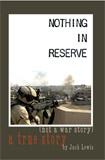“Spirit! Do not leave me!”
—Ebenezer Scrooge (Chas. Dickens), “A Christmas Carol”
What happened on Christmas Eve was odd enough that its strangeness persists still in reminding me of the unpredictable salvageability of human nature, and the omnipresence of . . . something. Whatever spirit it was, it moved them. It moved us.
Me, anyway.
Christmas Eve was a long, hyper-militarized day, riven by meetings, a large operation, and sundry coordinations. My team was fighting through the guard schedule and trying to hit our deadlines; I had scheduled myself for a 24-hour rotation at Tall ‘Afar Castle starting Christmas morning.
Because of this, I would miss both the Christmas Eve midnight service (because I needed the shuteye) and the Christmas evening service on the FOB. A little too busy to be much taken up by holiday sentiment, which was much as I had planned it. The sweet milk of nostalgia curdles quickly on an overseas tour; pasteurization requires rigorous attention to professional distraction. Many soldiers insulate themselves by withdrawing from the holidays and maintaining active antipathy to the so-called “Christmas spirit.”
Still, I was idly whistling a carol as I crossed the broad, dark, muddy savannah toward our post’s DFAC. It was cold as a colonel’s stare, dark as a Tomb with its stone unrolled, a moonless night and close to what the army calls “zero illum.” As “Hark the Herald Angels Sing” sputtered spit-fully through my teeth at low volume, I stumbled my way across the Stryker-rutted open and wished for little radars on my feet.
Around me, tiny red and green LED lights, hanging from the DCU lapels of cavalry scouts and admin clerks and officers heading to and from chow, danced like wind-blown Christmas lights across the frosted night. Hearing a voice, I stopped walking and whistling to determine whether I was being greeted by someone with better night vision than my own. Given my vision, that would be nearly anyone.
Instead of a greeting, what I heard—low, yet distinct—was a young man’s voice singing “Hark the Herald Angels Sing.” On the same beat as I had been whistling.
Then he was joined by another voice, and some of the green and red lights slowed, and stopped. And they sang. Not out of courage but from not knowing what else to do, I joined in. Soon there were six or seven of us comfortably anonymous carolers joining our voices. Then perhaps ten, a dozen. Hoarse and smooth, high-pitched and gravelly: a sudden, unanticipated coalition of the willing. Just like the rest of the willing: all Americans.
The last and grandest voice to rise was a rich baritone, an Old Man River baritone, the kind of voice that if it was a Christmas cookie would be a rum ball made with the kind of over-proof Barbados that could knock a jack tar’s sea legs out from under him. Whoever owns that voice was born to be a drill sergeant, a preacher or the next Al Green: the kind of irresistible motivator that you’re immediately certain has been to the mountaintop. We sang three verses together, one right after the other, and while nobody knew all the words, somebody knew every word. “God and sinners”—a fieldful of sinners—“reconciled” for one warm, bright moment in the brittle darkness.
Before the third verse, despite full, unembarrassed voices from the lot of us, the baritone had taken the field. His voice led the group with a fantastic swell of volume and timbre, providing the kind of sonic cover that choirboys crave in order to sing out, unafraid of the kind of snickers and funny looks that boys don’t outgrow until, perhaps, their hair is gray.
“Pleased as man with man to dwell,” we bawled out to God, to each other, to loved ones not present, “Jesus, our Emmanuel!
“Hark the herald angels sing: glory to the newborn king!”
For a moment in the sudden, crashing silence that followed—a silence so complete that you could hear the twinkling of diamond-bright stars—it wasn’t a war zone at all. Not a base for combat, not a despot’s recycled airfield. It was, just for that moment of ocean-deep silence, the Holy Land.
Glory, indeed.
Our diaspora was subdued. Without a word, the dozen or so singers, secure in the knowledge that no one of us could identify the others in the light of day, began to move out. The little green and red lights—suddenly soldiers’ tactical illuminators, Christmas lights no more—bobbed off along various trajectories, their possessors quietly pursuing various military objectives.
Wrapped in that little piece of unexpected grace, I didn’t get cold the night of Christmas Eve. I didn’t feel sorry for myself for being away from my loved ones, though I missed them—and miss them still. I didn’t resent these Iraqis for their recalcitrant reluctance to see things my way.
I didn’t stumble again.
E-mailed 27 DEC 04, FOB Sykes, Tall Afar
They asked me if I would do a little number
And I sang with all my might.
She said, “Tell me, are you a Christian, son?”
I said, “Ma’am, I am tonight.”
—Marc Cohn, “Walking In Memphis”

 "Jack Lewis takes the overall literary crown with his new book...there’s a lot more to Lewis’s work than what it feels like to ride motorcycles.” — Ultimate Motorcycling
"Jack Lewis takes the overall literary crown with his new book...there’s a lot more to Lewis’s work than what it feels like to ride motorcycles.” — Ultimate Motorcycling
 "Insightful and from the heart ... a driven and much recommended look into the mind and conflict of the next generation of war veterans. " — Midwest Book Review (Reviewer's Choice)
"Insightful and from the heart ... a driven and much recommended look into the mind and conflict of the next generation of war veterans. " — Midwest Book Review (Reviewer's Choice)
Dammit, Jack, you keep breaking my monitors. That’s the third one this week gone all blurry on me…
I want one of those rum-ball Christmas cookies. 🙂
Thanks for sharing, Jack.
I know the secret of the rum balls…